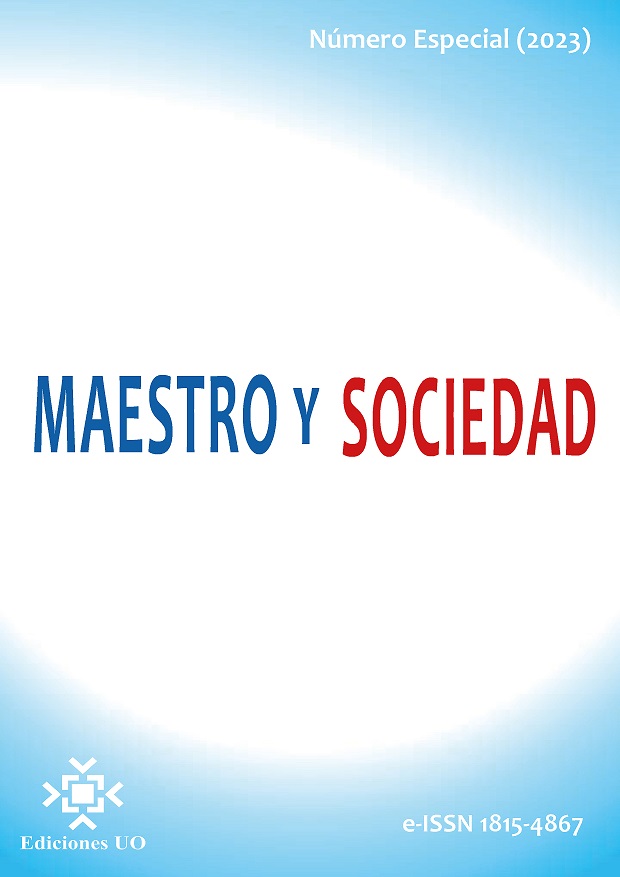Mejoramiento del desempeño matemático de los estudiantes de quinto grado de educación general básica mediante actividades investigativas estudiantiles
Palabras clave:
desempeño matemático, educación básica, estrategiaResumen
El desempeño matemático es un aspecto de suma importancia en la formación de los estudiantes que requiere mayor atención en el quinto grado de la Educación General Básica (EGB), desde la ciencia se precisa el problema científico: cómo contribuir al mejoramiento del desempeño matemático de los estudiantes de quinto grado de la EGB, asumiendo como objeto de la investigación la enseñanza–aprendizaje de la matemática en el quinto grado, y objetivo general: elaboración de una estrategia para el mejoramiento del desempeño matemático de los estudiantes de quinto grado de la EGB. El estudio de la literatura científica y didáctica revela que las actividades investigativas por los estudiantes y el Nearpod pueden contribuir al mejoramiento de su desempeño matemático, pero no se destacan suficientemente determinados vínculos esenciales entre estos, evidenciándose vacíos teóricos y prácticos. En este artículo se defiende la idea: si se utiliza una estrategia para la enseñanza-aprendizaje de la matemática en quinto grado de la Educación General Básica en Ecuador, que integre coherentemente actividades investigativas de los estudiantes con asistencia del Nearpod, en el marco del currículo priorizado con énfasis en competencias comunicacionales, matemáticas, digitales y socioemocionales, se mejora el desempeño matemático de los estudiantes. La estrategia presentada está estructurada en objetivo general, cuatro etapas con sus respectivos objetivos y acciones, sustentada en fundamentos anteriormente expuestos. Se introduce la estrategia en la escuela “Rafael Cruz Cevallos”, implicando a 68 estudiantes de quinto grado, obteniendo los resultados satisfactorios que se muestran en una tabla, con escalas cuantitativas y cualitativas cuatro niveles: muy bajo, bajo, medio y alto.
Citas
Arroyo, M. B. A., & Rodríguez, M. A. Y. (2020). Propuesta de herramientas TIC para facilitar el proceso enseñanza–aprendizaje de la matemática. Polo del Conocimiento: Revista científico-profesional, 5(12), 574-589. https://dialnet.unirioja.es/servlet/articulo?codigo=8042549
Bermejo, V. (2021). Herramientas educativas para la enseñanza online: asignaturas AICLE en primaria. [tesis posgrado, Universitat Oberta de Catalunya UOC]. BarelonaEspaña.http://openaccess.uoc.edu/webapps/o2/bitstream/10609/134012/1/Ver mejo_Rodriguez_Virginia_TFM%20%20ENTREGA%20FINAL%20.pdf https://acortar.
link/UfLaJa
de León, D., Sánchez, I., Koleszar, V., Cervieri, I., & Maiche, A. (2021). Actividades numéricas en el hogar y desempeño matemático en niños preescolares. Revista Argentina de Ciencias del Comportamiento, 13(3), 49-58. http://www.scielo.org.ar/scielo.php?pid=S1852-42062021000300049&script=sci_abstract&tlng=en
Duque-Romero, M., & Puebla-Molina, A. (2023). Educación básica: desafíos para la educación ecuatoriana post pandemia. Mendive, 21(2), e2956, https://mendive.upr.edu.cu/index.php/MendiveUPR/article/view/2956
González, J. I., & Granera, J. (2021). Entornos Virtuales de Aprendizaje (EVA) para la enseñanza-aprendizaje de la Matemática. Revista Científica De FAREM-Estelí, 49–62. https://doi.org/10.5377/farem.v0i0.11607
Hernández H, C. M, Vázquez C, Y. y Palma S, L (2017). Variantes en la implementación de actividades investigativas escolares y proyectos: dos ejemplos. Revista Didasc@lia: Didáctica y Educación, VIII(7).
Hernández H, C. M. (2021) Perfeccionamiento de la enseñanza-aprendizaje con enfoque investigativo creativo: acercamiento a fundamentos y contribuciones (39 páginas, pág. 107-146), Capítulo III en Libro: Concepciones y buenas prácticas en didácticas particulares. Cisneros G, S.; Hernández H, C.M; Aranda C., B.L.; Céspedes Q., A; Vinent M., M.V. Editorial: “Universo Sur”. Universidad de Cienfuegos. https://universosur.ucf.edu.cu/?p=2845
Hernández Hechavarría, C. M., & González Vidal, O. L. (2015). Actividad investigativa escolar y ejercicios en matemáticas: el papalote. UNIÓN-REVISTA IBEROAMERICANA DE EDUCACIÓN MATEMÁTICA, 11(42). https://www.revistaunion.org/index.php/UNION/article/view/632
Ministerio de Educación. (2023). ACUERDO Nro. MINEDUC-MINEDUC-2023-00008-A. https://educacion.gob.ec/wp-content/uploads/downloads/2023/03/MINEDUC-MINEDUC-2023-00008-A.pdf
Ordaz Villegas, G., & Acle Tomasini, G. (2021). Desempeño matemático. Evaluación por rúbricas en los primeros grados de educación básica. Perfiles educativos, 43(173), 76-93. https://www.scielo.org.mx/scielo.php?pid=S0185-26982021000300076&script=sci_arttext
Plaza, L., González, J., & Vasyunkina, O. (2020). Obstáculos en la enseñanza–aprendizaje de la matemática. Revisión sistemática. Sección 2/Propuesta para la enseñanza de las matemáticas, 33(1). http://funes.uniandes.edu.co/22406/1/Plaza2020Obstaculos.pdf
Quintanilla, V. A., & Gallardo, J. (2020). Identificar experiencias emocionales para mejorar la comprensión en matemáticas. Revista Uno, April. https://acortar.link/UwnEUM
Romero-Caballero, S. C., Hernández-Sánchez, I. B., Barrera-Villarreal, R. E., & Mendoza-Rojas, A. (2022). Inteligencia emocional y desempeño académico en el área de las matemáticas durante la pandemia. Revista de Ciencias Sociales, 28(2), 110-121. https://dialnet.unirioja.es/servlet/articulo?codigo=8378005
Descargas
Publicado
Cómo citar
Número
Sección
Licencia
Derechos de autor 2023 Rosario Margoth Arias Baño, Germania Cesilia Monar Mantilla, Wilber Ortiz Aguilar, Carlos Manuel Hernández Hechavarría

Esta obra está bajo una licencia internacional Creative Commons Atribución-NoComercial-SinDerivadas 4.0.
Esta revista proporciona un acceso abierto inmediato a su contenido, basado en el principio de que ofrecer al público un acceso libre a las investigaciones ayuda a un mayor intercambio global de conocimiento. Cada autor es responsable del contenido de cada uno de sus artículos. Los artículos pueden ser inéditos o estar disponibles previamente en servidores de preprints reconocidos por la revista. Sin embargo, no se permite la duplicación de la publicación o traducción de un artículo ya publicado en otra revista o como capítulo de un libro.
This journal provides immediate open access to its content, based on the principle that providing the public with free access to research supports a greater global exchange of knowledge. Each author is responsible for the content of each of their articles. Articles may be previously unpublished or available on preprint servers recognized by the journal. However, duplication of publication or translation of an article already published in another journal or as a book chapter is not permitted.
Esta revista oferece acesso aberto imediato ao seu conteúdo, com base no princípio de que oferecer ao público acesso gratuito à pesquisa contribui para um maior intercâmbio global de conhecimento. Cada autor é responsável pelo conteúdo de cada um de seus artigos. Os artigos poderão ser inéditos ou estar previamente disponíveis em servidores de preprints reconhecidos pela revista. No entanto, não é permitida a duplicação de publicação ou tradução de artigo já publicado em outro periódico ou como capítulo de livro.



























 Universidad de Oriente
Universidad de Oriente 